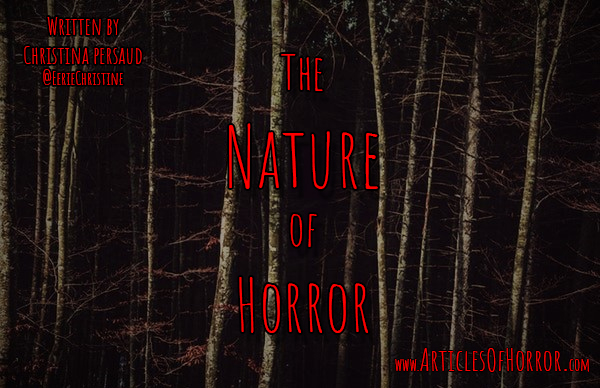
In the horror genre, a setting only nature can provide is a vital tool used among storytellers. Whether on a page or a screen, a night sky can bring about fear. The darkness can leave one feeling alone and vulnerable, unable to see far ahead to protect oneself if need be. Rain invokes sadness, sunlight a sense of fresh beginnings and hope. Caves, trees, riverbeds and the many dips and turns of grass and soil are for the storyteller to sculpt, like clay to an artist.
The setting of a forest is a playground for all of nature’s elements.
Forests in horror stories, books and movies are a staple in the genre. The trees provide a haven for the wicked, a place for evil to lurk and miserable creatures to hide. As far back as ancient folklore, forests have been a pathway into the uncertain. Tales from all parts of the world involve the hush of trees. Many folklore that originate from Europe harnesses its own geography to inject stories about witches hiding babies deep in the roots of Elder trees, of orb-like creatures called Will-o’-the-Wisps tricking visitors deeper into the woods and away from safe paths. Such folklore stem worldwide. Haunted trees are plentiful.
“We all have forests on our minds. Forests unexplored, unending. Each one of us gets lost in the forest, every night, alone.” Ursula K. Le Guin
Fast forward to modern day stories and The Blair Witch Project (1999), The Witch (2015), and The Ritual (2017) come to mind. Even with today’s modern technology, stories like ‘The Ritual’ argue that the sanctuary of a forest is no match for even the strongest wifi signal. Isolation provided in the setting of a forest rewards a creative mind, especially when attempting to achieve fear.
“Alone. Yes, that’s the key word, the most awful word in the English tongue. Murder doesn’t hold a candle to it and hell is only a poor synonym.” Stephen King

Why forests?
Traditionally, forests provide comfort to those around. The animals who live in their trees make it home, they eat the acorns, plants and berries that line the forest floor. Water pools and from it springs life all all variety. A forest is a place of birth and growth. But it also a place of death. When an animal dies in the forest, its body eventually rejoins the cycle of life and death. When there is a drought, all suffer. A forest is not only shelter, but a provider of all necessary staples for life. When one enters and relies upon it, the visitor is putting his or her life in the forest’s hands.
“Here, in the forest, dark and deep, I offer you, eternal sleep.” – The Poor Little Rich Girl

A forest’s tall trees give shade to all beneath whether there is sunlight or rain. This, to a horror storyteller, helps to provide the feelings of melancholy, impending danger, and fear into their audience. The loss of light means compromised sight into the distance, or symbolically, the future, and hence a disadvantage in overall survival. Studies show that ancient man preferred the savanna to the forest. Perhaps this is why a forest is a place for so many creatures and outcasts to hide, such as the Wild People of medieval Europe. Read more here.

If a forest is a protector, then it is a protector equally of both good and evil. Like the Brothers Grimm’s Hansel and Gretel tricked by a wicked witch in the forest, it is easy to be lured off the marked trail and into the unknown. Good and evil have a chance to survive in a forest, and that’s what makes for a frightening tale. The audience never knows for certain who will be the victor. The location alone is a treasure trove of ideas, plot twists, emotions and character. It provides a setting that comes with its own rules and mysteries, and for a storyteller, many of which are still yet to be discovered.
– By Christina Persaud
[DISPLAY_ULTIMATE_PLUS]
Sources:
-
Because I am Obsessed with “Get Out” | Awesomely Luvvie. (2017, May 8). Retrieved from https://www.awesomelyluvvie.com/2017/04/get-out-movie.html
-
The Blair Witch Project (1999). (1999, July 28). Retrieved from https://www.imdb.com/title/tt0185937/
-
Mysterious Haunted Trees of the World | Mysterious Universe. (2014, June 17). Retrieved from https://mysteriousuniverse.org/2015/03/mysterious-haunted-trees-of-the-world/
-
Outcasts: Prejudice and Persecution in the Medieval World comes to the Getty – Medievalists.net. (2018, January 22). Retrieved from http://www.medievalists.net/2018/01/outcasts-prejudice-persecution-medieval-world-comes-getty/
-
The Poor Little Rich Girl. (n.d.). Retrieved from http://www.geocities.ws/emruf5/poorlittle.html
-
Rackham, A. (1909). Hansel and Gretel. Retrieved from https://commons.wikimedia.org/wiki/File:Hansel-and-gretel-rackham.jpg
-
The Ritual (2017). (2017, October 11). Retrieved from https://www.imdb.com/title/tt5638642/?ref_=nv_sr_1
-
Treasure depicts medieval ‘Wild Man’. (2015, December 12). Retrieved from https://www.bbc.com/news/uk-england-suffolk-35050026
-
The Witch (2015). (2016, February 19). Retrieved from https://www.imdb.com/title/tt4263482/?ref_=nv_sr_1
[ajax_load_more post_type=”post” max_pages=”1″]
